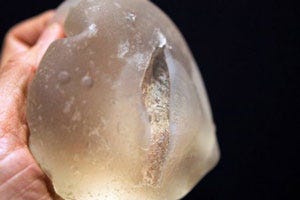October 21, 2013
A day before the European Parliament is scheduled to vote on adopting a more FDA-style method of medical device regulation, the continent's consumer organization BEUC is trying to put a human face on the issue with a video of medical device horror story testimonials.
The video includes some pretty sad stories. A Belgian woman Dora, for example, went with a "plastic carpet" to correct a prolapsed uterus -- a uterus that had slipped out of place.
Dora says in the video that the pain from the procedure never went away and that she was unable to resume her job as a healthcare worker: "I cannot sit comfortably in a nice chair. I cannot cross my legs as a woman."
Dora complained that there should have been more information up front about the implant's potential drawbacks and what she claims was its lack of effectiveness. And that seems to be the theme among the five women in the video, with problems including ruptured silicone implants, a malfunctioning pacemaker and a metal-on-metal hip implant with complications.
"They don't inform you at all. It's not in their interest," said a Danish woman Metta who had a malfunctioning hip implant. "They" seems to refer to Metta's health provider and whoever made the hip implant.
|
Cleared in the European Union, PIP implants have been shown to be prone to rupturing than implants made of medical-grade, rather than industrial-grade, silicone. |
The women's stories are not packed full of technical or product details, but they do allude to some of the regulatory issues that have cropped up in Europe amid a system that appears to offer more freedom but also more chances for error when it comes to delivering innovations to patients.
For example, the now-defunct French medical device manufacturer Poly Implant Prothèse (PIP) for about 10 years made and sold faulty breast implants made from industrial-grade silicone. The silicone used in these breast implants was of questionable safety, threatening the health of an estimated 400,000 women. As of now, more than 4000 of the breast implants have ruptured. Such implants also carry a risk of causing inflammation and irritation.
The PIP scandal helped cause the push for more EU regulation, as did an expose in the Daily Telegraph, a UK-based newspaper, which explained how an imaginary metal-on-metal hip implant won the CE Mark. At the time, metal-on-metal hip implants were involved in a major health scandal after researchers showed the implants could lead to cobalt poisoning. The implants could potentially release metal ions into the bloodstream, leading to inflammation and potentially rejection of the implant.
Problems with breast implants and metal-on-metal hip implants are well-represented in the BEUC video, which is embedded below:
But a big question also comes to mind: Will there really be more information for patients if the EU moves beyond its CE marking system to a more centralized regulatory framework, or is this really an issue about lack of information for patients?
Is more centralized regulation needed in order to ensure patients are informed before making a decision?
Interested in Dora's case, I did a quick Google search about "using plastic carpet to treat prolapsed uterus." Right near the top was a Cleveland Clinic Web page about the condition that lists "uterine suspension" as one of the potential surgical treatments.
Here's how the Cleveland Clinic describes uterine suspension:
"This procedure involves putting the uterus back into its normal position. This may be done by reattatching the pelvic ligaments to the lower part of the uterus to hold it in place. Another technique uses a special material that acts like a sling to support the uterus in its proper position.
Recent advances include performing this with minimally invasive techniques and laparoscopically (through small band aid sized incisions) that decrease post-operative pain and speed recovery."
The Cleveland Clinic describes special material and slings, and it is operating under the scrutiny of the mighty FDA. While the BEUC video is short on technical details, it does seem that Dora's "plastic carpet" was not that out of the norm.
Still, Europe appears to be headed away from a system criticized for allowing device companies to shop around for the most lenient regulatory body -- versus the United States, where the federal government calls the shots.
Jeffrey Shuren, MD, director of CDRH, has complained in the past that the EU system allows the public to be used as "guinea pigs" for device companies eager to get products to market. The BEUC video shows the guinea pigs look a lot like a person's mom and grandma.
The reforms underway in Europe could potentially make such people safer, but informing and empowering them is a different story.
About the Author(s)
You May Also Like



